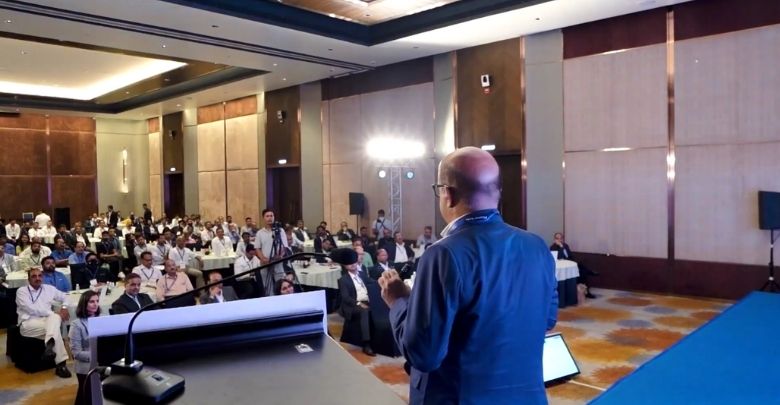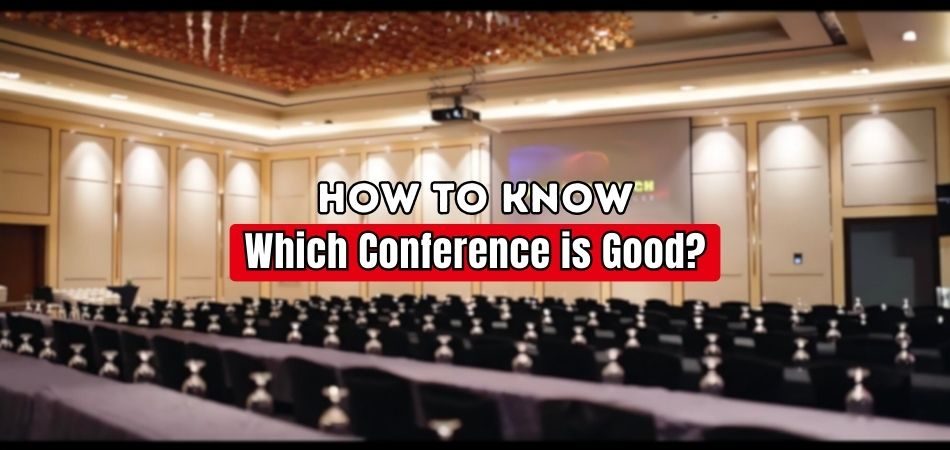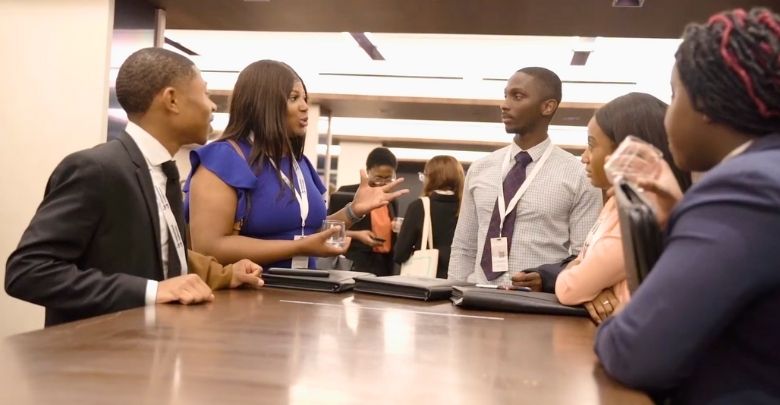In today’s world, there are countless conferences happening in every industry and academic field. With so many options available, it can be challenging to choose the right one to attend. This is where the question arises: How to know which conference is good?
To know if a conference is good, you need to consider its reputation, the quality of the speakers, and whether the topics align with your research or professional interests. Reviews from past attendees and conference rankings can also help you determine the event’s value before committing.
Curious to learn more about what makes a conference worth attending? Read on to discover everything you need to know, including how to make informed decisions and find the right conferences to maximize your professional and academic growth.
Why Choosing the Right Conference Matters?
Your professional and academic growth depends on choosing the right conference. Conferences provide unique opportunities to share your research, gain valuable feedback, and connect with other professionals in your field. The right conference can introduce you to new ideas and methodologies that can enhance your work.

Attending a well-suited conference helps you build a strong professional network. This network can lead to collaboration opportunities, job prospects, and mentorship relationships. By engaging with like-minded individuals and experts, you gain insights that can significantly impact your academic journey and career trajectory.
Additionally, focusing on reputable conferences is vital when looking for upcoming international conferences. These events often attract top researchers and industry leaders, offering valuable sessions and networking opportunities that can greatly benefit your professional life. Selecting the right conferences ensures that you are investing your time and resources wisely.
What to Consider When Choosing a Conference?
You should make thoughtful choices when choosing a conference that will benefit your career and research. There are several factors to keep in mind to ensure you make the most suitable selection. Careful consideration will help you maximize the advantages of attending.
- Budget Considerations: Calculate the total expenses involved, including registration fees, travel, accommodation, and meals, to ensure the conference fits within your budget constraints.
- Travel Options : Consider how easily you can travel to the conference venue, including visa requirements, transportation options, and whether the location is convenient for you.
- Conference Dates: Check the conference dates to make sure they don’t conflict with other important commitments and that you have ample time to prepare and attend.
- Publication Opportunities: Look into whether the conference offers opportunities to publish your work in proceedings or journals, which can improve your academic profile.
- Event Format: Decide if you prefer an in-person event or a virtual conference, considering how the format will affect your ability to participate fully.
- Skill Development: Check if the conference provides workshops, tutorials, or training sessions that can help you develop new skills relevant to your field.
- Diversity and Inclusion: Reflect on whether the conference promotes diversity and inclusion, offering a welcoming environment for participants from various backgrounds.
By considering these factors, you can make a well-informed decision that enhances your conference experience. Taking the time to evaluate your options ensures that you choose an event that aligns with your goals and maximizes the benefits you receive.
How to Know Which Conference is Good?
With so many conferences available, choosing the right one can be difficult, but attending a good conference can greatly benefit your research and networking. To analyze a conference properly, there are several key factors you should consider before deciding to attend.
Reputation of the Conference
A conference’s reputation is one of the most reliable indicators of its quality. Established conferences tend to attract reputable speakers, researchers, and participants. Look into the history of the event, check past participants, and evaluate whether it’s respected within your academic or professional community to ensure it meets high standards.
Quality of Speakers and Panels
The quality of keynote speakers and panelists plays a major role in determining the conference’s value. Conferences featuring renowned experts from your field often deliver more insightful presentations and discussions. A strong lineup of speakers not only enhances the learning experience but also provides networking opportunities for meaningful connections and collaborations.
Relevance to Your Research
Make sure the conference aligns with your research interests and career goals. Attending a conference focused on your specific discipline or niche area can provide targeted knowledge and insights. Review the agenda and topics to see if they match your current work, which can help you decide if it’s worth attending.
Size and Scope of the Event
Your overall experience can be shaped by the conference’s size. Large conferences may offer a wider range of sessions and networking opportunities but can feel impersonal. In contrast, smaller conferences often provide more intimate settings for deeper discussions and interactions, allowing for more meaningful exchanges among participants.
Attendee Feedback
One of the most effective ways to gauge a conference’s value is by reading attendee reviews and testimonials. Look for feedback on the sessions, organization, and networking opportunities from previous participants. This information can give you a clearer idea of whether the event delivers on its promises and if it suits your needs.
Researching Conference Rankings
It’s beneficial to consider various methods for finding conference rankings to assess the event’s quality. Many academic institutions and professional organizations publish rankings that help identify conferences recognized for their excellence and contributions to the field. This information can assist you in making an informed choice when selecting conferences to attend.
Networking Potential
A good conference should offer strong networking opportunities to maximize your experience. Evaluate whether there are sufficient breakout sessions, panel discussions, or social gatherings where you can interact with attendees. Engaging with other professionals is a key benefit of conferences, leading to collaborations and providing insights that can advance your research and career.
You should consider a conference’s reputation, relevance, and quality of speakers when deciding whether or not it is right for you. By analyzing these key elements and using tools like rankings and feedback, you can make an informed decision that aligns with your goals.
The Role of Feedback in Selecting Quality Conferences
When selecting a conference, feedback from past attendees can be a valuable resource. It provides insights into various aspects of the event, helping you evaluate its quality and determine if it aligns with your professional needs and goals.
Event Organization
From the registration process to the flow of sessions, feedback often illuminates how well an event was organized. When previous attendees highlight smooth transitions between sessions, timely schedules, and effective communication from organizers, it suggests that the event is well-managed. This organizational efficiency can impact your overall experience.
Session Engagement
An essential aspect of any conference is the engagement level of the sessions. Feedback can reveal whether participants found the sessions interactive, thought-provoking, and engaging. Positive reviews regarding the depth of discussions and opportunities for Q&A often indicate that attendees were actively involved and took away valuable insights from the event.
Quality of Workshops
Workshops are often a key feature of conferences, and feedback on these can provide valuable insights. By understanding whether past workshops were practical, hands-on, and applicable to real-world scenarios, you can gauge the potential value of attending. This information ensures you’re investing your time in skill-building opportunities.
Networking Dynamics
The feedback also provides insight into the networking opportunities provided by the event. Whether attendees had ample time to interact with others during breakout sessions, luncheons, or social events is a crucial factor. Strong networking opportunities help you connect with key professionals in your field, leading to possible collaborations.
Speaker Influence
An important factor in conference quality is the influence and expertise of speakers. Feedback on speaker presentations, their ability to engage the audience, and the relevance of their topics can help you determine whether the event will offer valuable insights. Professional speakers are often a draw for potential attendees.
During the conference selection process, feedback is an essential tool. Making well-informed choices based on the experiences of previous participants is possible. Prioritizing well-reviewed conferences ensures you gain the most from your attendance.
Tips for Following Up After Attending a Conference
For lasting connections and reinforcing what you’ve learned, it’s crucial to follow up after a conference. A thoughtful approach allows you to benefit from your conference experience long after it is over.
Send Thank-You Notes
Expressing appreciation to speakers, organizers, and new connections can go a long way. Sending personalized thank-you notes or emails helps you leave a lasting impression. Highlight specific insights you gained from their presentations or conversations. This shows genuine appreciation and fosters a positive relationship for future interactions.
Connect on Social Media
Using social media to maintain relationships after a conference is a powerful tool. Connecting with fellow attendees and speakers on platforms like LinkedIn can keep the conversation going. Share your insights from the conference, engage with their content, and stay updated on their professional activities. This can lead to valuable networking opportunities.
Share Your Experience
You can provide value to others by sharing your conference experience through a blog post or social media update. Discuss what you learned and the key takeaways from the sessions you attended. This not only showcases your knowledge but also invites feedback and engagement from your network.
Organize Your Notes
Take the time to review and organize your notes from the conference. Highlight important points, action items, and follow-up tasks. This will help you recall key insights when you reach out to connections or apply what you learned in your work. Staying organized ensures you make the most of the information gathered.
Plan for Future Events
Reflect on the conference experience and identify areas for improvement in your future attendance. It is worth exploring ways to check upcoming conferences to continue your professional growth. By taking such an approach, you will be able to stay in touch with the industry and expand your network.
Making the most of your conference attendance requires following up afterward. Thoughtful actions can solidify new relationships and improve your knowledge, paving the way for future opportunities and continued professional development.
FAQs About How to Know Which Conference is Good?
When there are so many options available, choosing the right conference can be a daunting task. To help you make informed decisions, we’ve compiled some frequently asked questions. These will guide you through important considerations when selecting the best conference for your academic or professional needs.
How Can I Research Conference Organizers?
To determine the reputation of a conference, it is essential to research the organizers. Check the organizer’s background, previous events, and affiliations. Review feedback from past conferences they’ve hosted to gauge professionalism and organizational quality. Trusted organizers often indicate that the conference will be well-structured and valuable.
What Should I Look for in Conference Sponsors?
The quality of a conference can be determined by its sponsors. Established, reputable sponsors typically associate themselves with excellent events. Look for industry leaders or well-known organizations backing the event, as this indicates the conference’s alignment with your field and signals potential networking opportunities.
How Important is a Conference’s Location?
The location of a conference can influence its value. A strategically located event may attract international experts and larger, more diverse audiences. Additionally, accessibility and convenience should be considered, especially when balancing travel time, accommodation, and overall costs.
How Do I Assess the Quality of Conference Materials?
A well-organized conference materials, such as detailed programs, speaker bios, and presentation summaries, are good indicators of a well-organized event. Check whether these materials are comprehensive and well-prepared. This can give you insights into how professional and engaging the sessions will be.
Can Social Media Help in Analyzing a Conference?
Yes, social media is a powerful tool for evaluating conferences. Search for event hashtags, follow organizers, and check posts from previous attendees. This will give you real-time feedback, event highlights, and opinions on whether the conference provided valuable content and networking opportunities.
Closing Thoughts
Your academic and professional development depends on choosing the right conference. With numerous options available, it’s important to make informed decisions to ensure you maximize the benefits of your attendance. Each conference presents unique opportunities for growth and learning, making careful selection essential.
To determine how to know which conference is good, consider factors such as the event’s reputation, the quality of speakers, and the relevance of topics to your work. Researching past attendee feedback and considering networking opportunities will also guide your decision-making process. Understanding these key aspects will help you select a conference that aligns with your goals.
Don’t forget to set a budget, review the agenda, and connect with peers before your conference. These tips will improve your experience and help you make the most of it. I wish you success in finding conferences that inspire and advance your career!







